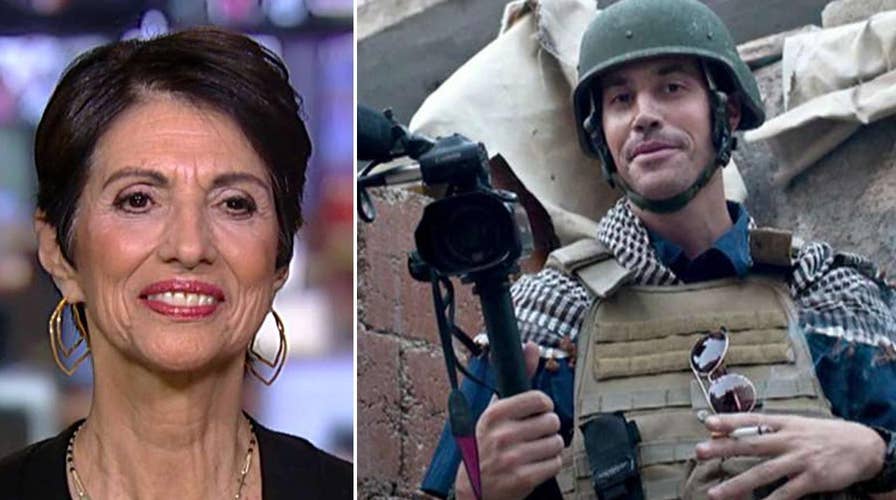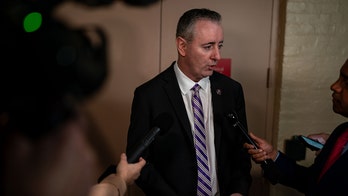James Foley's mother praises improvements in government coordination with families of US hostages
Diane Foley is the founder of the James Foley Foundation which was created to protect conflict journalists and help American hostages return home.
It has been five years since American journalist James Foley was beheaded by ISIS terrorists in Syria. Now his mother, Diane Foley, says her foundation—in cooperation with Washington, D.C. think tank New America—has conducted a survey that shows major strides for the families of U.S. hostages.
On Wednesday, the James Foley Legacy Foundation released a report suggesting that families of U.S. hostages are finding significant improvement in dealing with government agencies to get information about their loved ones. Additionally, an increasing number of U.S. citizens held captive has returned home.
While the survey notes that hostage families felt a “deep concern” with the Trump administration’s initial delay in filling the Special Presidential Envoy for Hostage Affairs position, responses from those still engaged in recovery efforts reveal a continued reliance on the new framework.
Appearing on “America’s Newsroom,” Mrs. Foley told host Benjamin Hall: “I applaud the Trump administration for continuing this structure in place. Because this is definitely an improvement.”
James Foley had been taken hostage and help captive for nearly two years prior to his execution. His captors demanded millions of dollars in ransom payments.
During that time, Mrs. Foley was desperately trying to receive updates on the efforts to secure his release back in the United States.
According to her interview with CNN on Monday, she made monthly trips from her home in New Hampshire to Washington, D.C. and set up as many meetings as she could with national security officials.
The same agency would often send her to different people who had limited information on her son’s case, she said. She remembers she felt she had been lied to.
“There was no one whose job was to help strategize to bring Americans who are innocently taken hostage abroad home. So, it was a horrible ordeal and that’s why we undertook this research—to talk to other families,” she told Hall.
The survey also says that the changes followed an overhaul of hostage policy and an admission by President Barack Obama in 2015 that the government had let down some of these families.
Twenty-two hostages and family members participated in the survey. Nearly all of the participants whose cases began after or continued through the implementation of the new policy said the government gave them honest assessments of intelligence and rescue plans.
They noted a greater prioritization of their cases by senior government officials — a noticeable turnaround from the responses of people with cases that unfolded before the policy change.
“Overall, post-PPD-30 families reported feeling better understood and supported and believed that they were being treated with empathy and compassion,” the survey says. The PPD refers to a presidential policy directive launched as part of the new plan.
PPD-30 and a simultaneous executive order came after a dark period for journalists under the Obama administration.
The plan the president laid out for his executive order aimed to break a bureaucratic approach to hostage recovery and committed to more open relationships with families.
“However, one of the findings was that there are also unlawfully detained Americans held by foreign governments that don’t have the same inter-agency support that hostage families have,” Mrs. Foley said.
CLICK HERE TO GET THE FOX NEWS APP
In 2018, the State Department said that there were less than 20 citizens being held by criminal or terror groups abroad. Meanwhile, the count of citizens detained by foreign governments in situations that are considered unlawful remains high.
That said, over a dozen men and women held hostage or detained unlawfully have been returned so far under the Trump administration.
Nevertheless, the unlawfully detained don’t necessarily receive the same attention and resources of the hostage recovery framework.
Mrs. Foley cited Dr. Walid Fitaihi, a Harvard-trained doctor, television host and motivational speaker. Fitaihi was arrested last year along with 17 others in what Saudi Arabian Crown Prince Mohammed bin Salman touted as a crackdown on corruption.
“Our government makes that distinction,” she said. “An example is Saudi Arabia holding an innocent Harvard educated doctor—Walid Fitaihi . I’m hoping that President Trump and Secretary Pompeo will reach out to MBS when they are at the G-20 and ask for the release of Doctor Fitaihi as well as others being held unlawfully by Iran, Venezuela, Syria…so many.”





